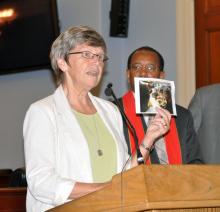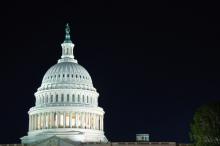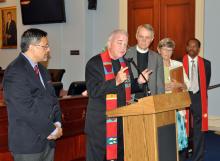Economic Justice
 The global movement to implement a small tax on some financial industry trades has gained its first European partner: France. Religious and economic reform groups have been leading the movement to implement versions of what has been called the "Robin Hood Tax" or the "Tobin Tax" since the 1990s. As global markets falter and national economies are brought to their knees by an unregulated financial industry, this financial transaction tax is one small way to impact global reform.
The global movement to implement a small tax on some financial industry trades has gained its first European partner: France. Religious and economic reform groups have been leading the movement to implement versions of what has been called the "Robin Hood Tax" or the "Tobin Tax" since the 1990s. As global markets falter and national economies are brought to their knees by an unregulated financial industry, this financial transaction tax is one small way to impact global reform.
>>On 1 August, France became the first European country to introduce a new financial-transaction tax (FTT) on equity sales and high-frequency trading.
The FTT, often called a ‘Robin Hood tax', is a tax on selected products traded by the financial sector, such as equities, bonds, foreign exchange and their derivatives. Where those countries where such a tax has been introduced (in South Korea, South Africa, India, Hong Kong, the UK and Brazil), the tax may have been tiny (ranging between 0.005% and 0.5%), but it has raised substantial amounts of revenue. The FTT discourages high-risk financial operations and makes the financial sector pay its fair share of taxes. This is sensible: a reckless casino culture in parts of the financial sector caused the financial crisis. It is also fair: our governments bailed out the banks but left taxpayers with debts of trillions.<<
Read more here.

Sister Simone Campbell sat down with Fox News' Bill O'Reilly to discuss her organization's push for a faithful budget.
Campbell, executive director of NETWORK, recently invited presidential candidate Mitt Romney to join the Nuns on the Bus in some of their charitable work with the poor.

Over the past few weeks, Christians have written Alabama Gov. Robert Bentley asking him to stop the immoral practices that plague the state’s criminal justice institutions. This incredible outcry from the faith community demonstrates their outrage at stories of people in poverty spending days, weeks, and months in jail over their inability to pay fees and fines to private companies contracted to administer parts of Alabama’s system.
When contacted by Sojourners for a response to the thousands of messages received from people of faith about this issue, Jeremy King, spokesman for Gov. Bentley’s office responded, "We can review this issue and move forward from there."

Not only has interfaith meal packaging been repeated multiple times in my community, but this weekend I’ve also heard the stories of hundreds of secular and faith-based communities mobilizing together to address issues of world hunger. Representatives of one church-based organization described their collaboration with a local Buddhist community that contributes rice to the packaging efforts. Last month at Kids Against Hunger headquarters, members of a mosque, a church, and a synagogue came together to produce over 8,000 meals — an activity that they hold quarterly with a shared meal and socializing.
These stories of interfaith collaboration are inspiring, but too rare.
My friend Eboo Patel says that “if we don’t find a way to make faith a bridge of cooperation and not a bomb of destruction, then we’re in trouble.”
When meal-packaging projects become collaborations between communities that have historically clashed, stereotyped, judged, or ignored each other, then bridges are being built instead of bombs. And not only do hungry kids need food, but this is a time when our increasingly religiously diverse country needs to learn to build bridges.

In the Australian city where I live, there is a housing crisis.
Only 2 percent of rental properties are vacant. The mining boom has seen a huge increase in the number of renters and this additional competition has left parties outbidding each other to lease the few rental properties on the market.
In this environment, immigrants, generally, and refugees in particular, struggle to access affordable accommodation, let alone accommodation close to employment opportunities or community services.
In the community I helped found and where I have spent the last eight years — going through the highs and lows of radical hospitality, direct action, gardening, praying, and cups of tea — we feel called to leave.
Author and academic Jeffrey Sachs argues in a Huffington Post piece:
Consider the new U.S. unemployment announcement. If you are a college graduate, there is no employment crisis. 72.7 percent of the college-educated population age-25 and over is working. The unemployment rate is 4.1 percent. Incomes are good.
If you have less than a high-school diploma, however, you are barely scrapping by. Only 40.4 percent of those without a high-school diploma have a job. Their unemployment rate is 12.7 percent. Incomes are too low to make ends meet.
There are two Americas: the college-educated crowd that may have taken a hit in their retirement accounts, but who are generally doing well. Then there are the rest, around 60 percent of the population, who are increasingly dropping out of the middle class. Nearly one-half of American households are now classified as low-income, within twice the poverty line.
Read more here
In an op-ed for Politico, two Representatives highlight the recent cuts to food assistance programs, and the damaging effects they will have on the state of the nation:
The House gutted $16.5 billion from food stamps — our nation’s most important anti-hunger program, which gives low-income families modest aid during tough times. These cuts mean up to three million low-income Americans – largely families with children – can’t buy food.
These cuts in the Supplemental Nutrition Assistance Program also eliminate free school meals for 280,000 children. School breakfast or lunch is too often the only complete meal a child can eat all day. We expect our students to compete in a global economy. We expect them to come to school ready to learn — but we conveniently ignore the facts.
Poor nutrition negatively affects students’ academic achievement. Children who are hungry often miss more days at school and, when they do attend, they may have more trouble concentrating. They often have lower test scores.
Right now, 46 million Americans live in poverty, and more than 32 million adults and 16 million children live in food-insecure households. These families struggle every day to make ends meet — particularly as food prices continue to rise. As more and more families are getting by on less and less, food stamps help make groceries more affordable, so parents have more money to pay the rent, gas up their car and meet their children’s other basic needs. Food stamps kept 4 million Americans over the poverty line in 2010, including 2 million children, and lifted another 1.3 million kids above 50 percent of the poverty line. More than any other benefit program.
Read the full article here
Duke professor Dan Ariely writes for The Atlantic:
The inequality of wealth and income in the U.S. has become an increasingly prevalent issue in recent years. One reason for this is that the visibility of this inequality has been increasing gradually for a long time--as society has become less segregated, people can now see more clearly how much other people make and consume. Owing to urban life and the media, our proximity to one another has decreased, making the disparity all too obvious. In addition to this general trend, the financial crisis, with all of its fall out, shined a spotlight on the salaries of bankers and financial workers relative to that of most Americans. And on top of these, and most recently, the upcoming presidential election has raised questions of social justice and income disparities, bringing the issues into focus even more.
Check out the piece for more insight

On December 19, I am hosting a public reading of the 2010 Department of Defense Appropriations Act. I am doing so because page 45 of this 67-page document contains a generic, non-binding apology to native peoples on behalf of the citizens of the United States.
This apology was not publicized by the White House nor by Congress. As a result, a majority of the 350 million citizens of the United States do not know they have been apologized for. And most of the 5 million Indigenous Peoples of this land do not know they have been apologized to.
... This apology is a part of our country's history. Our leaders wrote it, the 111th Congress passed it, and President Barack Obama signed it into law. Then, unfortunately, they buried it. I am not protesting this, nor am I celebrating it. I am merely attempting to publicize it in the most open, respectful, and sincere way I know how.

Editor's Note: The following remarks were given on Capitol Hill on Aug. 1 as part of a call from faith leaders across the religious spectrum urging Congress to extend the Earned Income Tax Credit and Child Tax Credit for low- and moderate-income Americans.
A budget is a moral document. That phrase was coined by the faith community and has become a refrain in the ongoing debates over deficits and budgets. But in this week’s House vote on extending the Bush era tax cuts, we see one more example of the priorities and principles of the broader GOP budget and how they apply to the rich and to the poor. Because of this, we must conclude that the Republican budget is an immoral document—in the way it treats the poor. I certainly don’t believe that all our Republican lawmakers came to Washington to hurt poor people, but it’s time for some of them to challenge the dominant forces in their party and face the consequences of such indefensible choices.
We have a genuine hope for a long term bi-partisan solution and, in particular, a moral non-partisan commitment to protect the poor and vulnerable from being expendable in these fiscal debates. We should also say that Democratic budgets have not been models of fiscal responsibility and social justice, either. But what the House budget is calling for is morally objectionable on religious and biblical grounds—and people of faith from all political stripes should say so. In particular, to roll back tax credits for the poor to help fund tax breaks for the rich is morally reprehensible, and the faith community has to speak out.

Faith leaders on Wednesday gathered on Capitol Hill to release a letter calling on Congress to extend the Earned Income Tax Credit (EITC) and Child Tax Credit (CTC) — programs aimed at keeping the poor and most vulnerable in our country out of poverty. The call comes in advance of a U.S. House of Representatives vote to extend the Bush-era tax cuts.
In 2010, the EITC and CTC lifted about 9 million people out of poverty, including 4.9 million children, according to the Center on Budget and Policy Priorities.
"The Bible confronts every Evangelical lawmaker with more than 2,000 verses, which call us to defend the poor and vulnerable. If we say we believe the Bible, we simply can’t support policies that directly reward the rich and punish the poor: Christian lawmakers can’t keep going into their prayer breakfasts and leaving their Bibles at the door," said Jim Wallis, president and CEO of Sojourners (Wallis' full statement can be read HERE).
LATE LAST YEAR, President Obama made a pilgrimage of sorts to the sleepy town of Osawatomie, Kansas, to talk about the economy. He went there because it’s where, in 1910, Teddy Roosevelt gave one of his most famous speeches, called “The New Nationalism,” which was, in part, an attempt to unite his party around a common vision of a well-managed economy.
Obama’s mission was similar, although more focused on philosophically framing up the 2012 elections. The White House communications staff had built up expectations about the speech, and the president delivered, movingly describing how America can better encourage innovation, shore up the middle class, and expand opportunity. For the most part, the media were aglow.
A few minutes in, he quoted from Roosevelt’s speech: “‘Our country,’” Obama said, “‘means nothing unless it means the triumph of a real democracy ... of an economic system under which each [person] shall be guaranteed the opportunity to show the best that there is in him [or her].’”
But, notice those ellipses. What he omitted was an important phrase from the original quote: “the triumph of popular government.” Five words may not seem like much. Perhaps the president felt as if “real democracy” said enough, or perhaps his speechwriters felt as if it wouldn’t be politically prudent for him to speak so highly of government. But the omission also points to a larger exclusion, not just in Obama’s speech, but in his presidency and, most significantly, in our country’s priorities.
HISTORICALLY, MOST ECONOMIC systems revolve around who owns the wealth. As an economist and historian, this is the question I bring to any discussion about our current economic crisis and any future “new economy” we might imagine.
While income distribution is important, wealth distribution is much more unevenly allocated in American society, and it gets very little attention. Let’s quickly look at the numbers.
The richest 400 people in the U.S. own more wealth than the bottom 60 percent of the population. That’s more wealth (stocks, bonds, and businesses, but also houses and cars) than the bottom 150 million Americans. And the top 1 percent owns almost 50 percent of the society’s productive investment assets (corporate stocks, bonds, and privately held businesses, excluding cars and houses).
When you ask who owns the productive assets of the society, then you’re asking who owns American capitalism. The answer is: The top 1 percent owns just under half of it.
With this kind of wealth distribution, what we have is literally a medieval structure. I don’t mean that figuratively. It is a feudalistic structure of extreme power and wealth. And it is anathema to democracy to have that kind of concentration. This distribution of wealth—and the the fact that the top 1 percent has, over the last 30 years, increased its share of income from about 9 percent to about 20 percent—tells you something about the political/economic power harnessed to achieve that end.
The “new economy movement” that is building momentum around the country asserts that you can’t have a democratic society unless you democratize the ownership of wealth as well.

THE FARM BILL has a profound impact on farming and nutrition. Three key things the multi-faceted bill provides are: a safety net for farmers, incentives for conservation practices, and food assistance for low-income families. Congress writes the farm bill every five to six years; the most recent Farm Bill, approved in 2008, expires Oct. 1.
At present, nearly 80 percent of the bill’s roughly $100 billion a year in spending goes to the food-assistance category, most notably to food stamps—the Supplemental Nutrition Assistance Program, which now helps feed 46 million people in the U.S. Less than 10 percent of current Farm Bill funding supports water and soil conservation practices, such as no-till farming and preserving wetlands and grasslands.
In the past, a significant part of the bill has been commodity payments made under various programs to farmers of crops such as corn, wheat, rice, cotton, and soybeans (but not fruits or vegetables). As farmers are currently benefiting from high grain prices, while the government faces budget deficits, the next Farm Bill seems poised to recognize that the time has come to end commodity payments.
However, farmers, challenged by volatile swings in crop prices and by uncertain weather, still need a safety net. In lieu of commodity payments, the Senate version of the Farm Bill, passed in late June, moves toward subsidizing crop insurance, which covers farmers—including fruit and vegetable growers—against both poor yields and poor prices.

Here's something curious.
Big banks can't make money without cheating, manipulating interest rates, selling overly risky products and betting against their customers.
Big pharmaceuticals can't make money without paying competitors to keep their generic products off pharmacy shelves.
Google and Facebook can't make money without monetizing customers' privacy and violating their trust. Game maker Zynga can't make money, period, but its insiders did sweep $516 million off the table by unloading soon-to-plummet stock before a lousy earnings report.
Rupert Murdoch's media empire can't make money without tapping telephones and politicizing the news on which democracy depends.
And these are the people we are supposed to trust, admire, treat as superior and as worthy of huge salaries and government bailouts.

Every school day just after 2 p.m., Sandra pushes her cart into my classroom to clean the bathroom and empty the trash cans. She is the school custodian and my students love her. When students hear her squeaky wheels in the hallway outside our door, they listen for her kind giggle as she enters the room. "Ms. Sandra! Ms. Sandra! Can I help you empty the trash? Can I help you?" they yell out with their hands waving in the air.
She responds, "Jennifer, you look so cute today! How you doin' VicTOR? Francisco, baby, you look like you're doing a good job for Mr. Barton. You come on over and help me today. Anna, honey, that's okay, you can help me tomorrow." She knows all of my students by name.
Writing in response to Peter Edelman's article on ending poverty in America, Tim Worstall counters:
The reason we can’t end poverty in America is not because the country isn’t rich enough to do that: it is rather because of the ignorance of those who would end poverty in America. Peter Edelman has an Op/Ed in the New York Times which shows this to horrific effect. And what’s really worrying is that Edelman is supposedly one of the experts on how we ought to reduce poverty.
One point that has to be made about poverty right at the start: to all intents and purposes America, like all other industrialised nations, has abolished poverty. What we have traditionally called poverty that is. Proper destitution, people dying of starvation in the streets from the lack of the wherewithal to purchase food. Absent drug or mental problems this simply does not happen any more. The reason being that we’ve all had those industrial revolutions and the societies are rich enough that we make sure such doesn’t happen. Sure, different places have different ways of doing it, some more governmental and tax based than others, but that basic job of feeding the starving, clothing the naked and sheltering the homeless does get done.
Read more here
Peter Edelman writes for The New York Times:
The Associated Press reports on new analysis on global poverty:
Poverty across the planet will be virtually eliminated by 2030, with a rising middle class of some two billion people pushing for more rights and demanding more resources, the chief of the top U.S. intelligence analysis shop said Saturday.
If current trends continue, the 1 billion people who live on less than a dollar a day now will drop to half that number in roughly two decades, Christoper Kojm said.
"We see the rise of the global middle class going from one to two billion," Kojm said, in a preview of the National Intelligence Council's global forecast offered at the Aspen Security Forum in Colorado.
"Even if some of the most dire predictions of economic upheaval" in the coming years prove accurate, the intelligence council still sees "several hundred million people...entering the middle class," Kojm said.
Learn more here